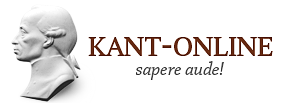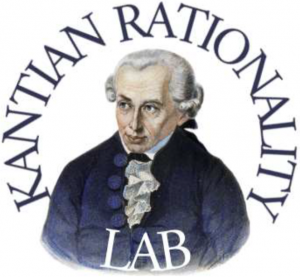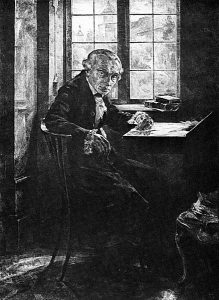KANTIAN RATIONALITY IN PHILOSOPHY OF SCIENCE
Online Conference
9-11 October, 2020
Immanuel Kant Baltic Federal University (IKBFU), Kaliningrad
Kant’s notion of reason or rationality as related to the sciences is multifaceted. For instance, reason provides certain “ideas” for scientific research and for the integration of its results; it has methodological functions in theoretical explanation, experimentation (including thought experiments), or mathematical proof. Moreover, reason is the source of the “form” and “matter” of the so-called Vernunftwissenschaften, such as logic, mathematics, metaphysics, and pure natural science, but also plays theoretical roles in empirical sciences such as history and anthropology. In addition, reason guides the structured classification or “architectonic” of all sciences into one complete and consistent system. This diversity of aspects and activities of reason for the sciences needs to be understood; and one equally well needs to ask what, if anything, unifies that rich diversity. Last but not least, the conference also aims to take a fresh look at Kant’s impact for accounts of scientific rationality up until today. How has the concept of such rationality developed after Kant? Where did he have an influence, and where did new assumptions and agendas emerge and why? Where can current debates still profit from Kant’s account?
Organized by:
Prof. Dr. Thomas Sturm
Prof. Dr. Nina Dmitrieva
Dr. Andrey Zilber
Video records of talks – playlist
Program
(Kaliningrad time = Central European Time)
October 9
14:30 Welcome: Thomas Sturm & Nina Dmitrieva
Chair: Rudolf Meer
14:45 Thomas Sturm
A Pluralistic Account of Reason in Kant’s Philosophy of Science
15:45 Michiel Van Lambalgen
Kant’s Transcendental Logic Presupposes that Ideas of Reason are Totalities
16:45 Break
17:15 James Hebbeler (Philadelphia 11:15 a.m.)
The End of Explanation: Kant and the Domain of Science
18:15 Hein Van den Berg & Boris Demarest
Kant on Scientific Hypotheses: Historical and Systematic Perspectives
19:15 Break
19:45 Huaping Lu-Adler (San Jose, CA 10:45 a.m.)
October 10
Chair: Martin Sticker
14:30 Rudolf Meer
Between Old and New Teleology. Kant on Maupertuis’ Principle of Least Action
15:30 Angela Breitenbach (Cambridge 14:30)
Kant’s Normative Conception of Science
16:30 Break
17:00 Lydia Patton (Blacksburg 11:00 a.m.)
18:00 David Hyder (Ottawa 12:00 a.m.)
Space, Time and Cause: The Rational Determination of Nature in Kant and Einstein
19:00 Break
19:30 Michael Bennett McNulty (Twin Cities 12:30 a.m.)
The Unity of Reason and Its Varieties:
Systematicity in Chemistry, Psychology, and Natural History
October 11
Chair: Vadim Chaly
14:30 Sergio Alberto Fuentes Gonzalez
Thought Experiments in Kant’s Philosophy: Types, Roles and Applications
15:30 Alexey Zhavoronkov (Moscow 16:30)
Kant’s Pragmatic Reason in Contemporary Sociology:
Third Way or Methodological Impasse?
16:30 Break
17:00 Valentin Bazhanov (Ulyanovsk 19:00)
The Concept of Number Through the Lens of
the Kantian Research Program in Current Neuroscience
18:00 Leonid Kornilaev
The Problem of Unity and Disunity of Science: Kant vs. Kuhn
19:00 Break
19:30 Karin de Boer & Pavel Reichl
Kantian Elements in Metzger’s and Kuhn’s Historiographies of Science
End of Conference
***
Speakers
Valentin Bazhanov – Ulyanovsk State University / Immanuel Kant Baltic Federal University (Kaliningrad)
Angela Breitenbach – King’s College, University of Cambridge
Karin De Boer – Catholic University of Leuven & Pavel Reichl – Heidelberg University
James Hebbeler – Saint Joseph’s University (Philadelphia)
Michael Bennett McNulty – University of Minnesota (Twin Cities)
Sergio Alberto Fuentes Gonzalez – Immanuel Kant Baltic Federal University (Kaliningrad)
David Hyder – University of Ottawa
Leonid Kornilaev – Immanuel Kant Baltic Federal University (Kaliningrad)
Huaping Lu-Adler – Georgetown University
Rudolf Meer University of Graz / Immanuel Kant Baltic Federal University (Kaliningrad)
Lydia Patton – Virginia Polytechnic Institute and State University
Thomas Sturm – Universitat Autònoma de Barcelona & ICREA / Immanuel Kant Baltic Federal University (Kaliningrad)
Michiel Van Lambalgen – University of Amsterdam
Hein Van den Berg – University of Amsterdam & Boris Demarest – Heidelberg University
Alexey Zhavoronkov – Institute of Philosophy, Russian Academy of Sciences (Moscow) / Immanuel Kant Baltic Federal University (Kaliningrad)
This event is the first in a series of three international conferences organized by the Kantian Rationality Lab – an international research project located at the Immanuel Kant Baltic Federal University (Kaliningrad). The project, with currently 20 team members, focuses in study of Kantian rationality in philosophy of science, in ethics and in the project of Enlightenment.
Our conferences are supported by the Ministry of Science and Higher Education of the Russian Federation grant no. 075-15-2019-1929, project Kantian Rationality and Its Impact in Contemporary Science, Technology, and Social Institutions, Immanuel Kant Baltic Federal University (IKBFU), Kaliningrad.



